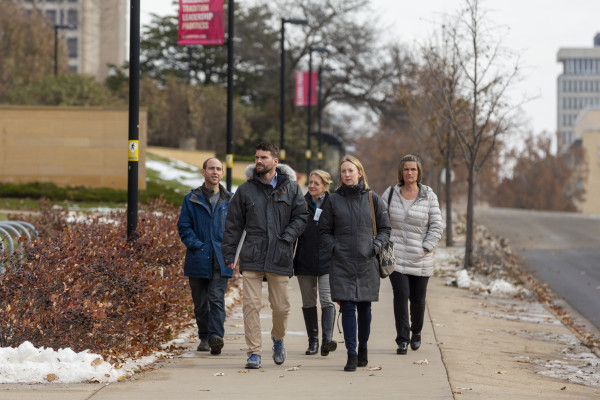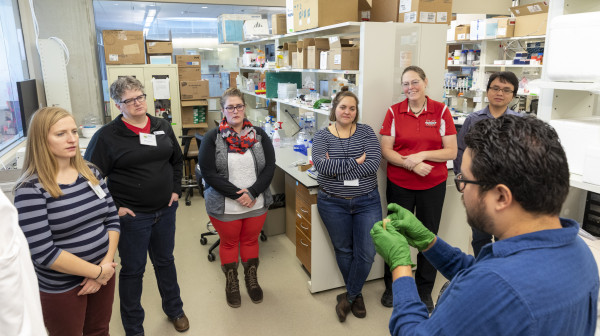What’s Right With Rural
Teacher Speakout! keeps conversation going between rural Wisconsin teachers and education researchers
December 4, 2019 | By Lynn Armitage

Justin Gerlach, 2018 Wisconsin Rural Teacher of the Year, shares his experiences as a STEM teacher in Mishicot.
We hear a lot about the challenges of rural education: declining enrollment, limited resources and funding, difficulty recruiting teachers and keeping them. And at UW‒Madison’s Rural Education Research & Implementation Center (RERIC), much good work is being done to improve educational outcomes in the state’s distant, sometimes forgotten classrooms.
But on a recent day in November, the narrative shifted when 19 science, technology, engineering and math (STEM) teachers from 18 rural school districts in Wisconsin traded stories at the third annual Teacher Speakout! sponsored by RERIC, housed at the Wisconsin Center for Education Research in UW–Madison's School of Education. This exchange of ideas between teachers, researchers, policymakers and rural advocates turned into a public display of spirit, grit and passion for what is right with rural education.
“I get to work where everyone else wants to vacation,” mused Olivia Dachel, a 19-year high school business, science and computer science teacher at Merrill High School who considers the unquestionable beauty of the Northwoods a big draw for living and working there.
Jessica Dennis teaches math and science on remote Washington Island, the smallest K-12 district in the state with a mere 77 students. The island is accessible only by ferry, but Dennis said, “It is one of the most magical places on earth. Disney World has nothing on us!”
At this year’s Teacher Speakout! the focus was on STEM education, identified by RERIC as a research priority. “In our conversations with rural school administrators, educators and parents, we hear about challenges in hiring and retaining STEM teachers, as well as concern over being able to offer STEM courses similar to larger districts,” said Craig Albers, RERIC’s co-director. “We hope participants were able to learn about opportunities at UW‒Madison to further strengthen their STEM programs, as the number of STEM-related jobs continues to grow in this country.”
RERIC Co-Director Andy Garbacz adds that the research organization has also grounded its work in developing strong partnerships with the rural educational community. “We are focused on building collaborations, like we did at Teacher Speakout!, to enhance educational experiences for teachers, families and students.”
Rural teachers are resourceful.
According to UW‒Madison’s Applied Population Lab, enrollment in rural schools has declined 8 percent over 13 years. In a state where funding for public education is partially tied to student enrollment, rural schools—notorious for small class sizes— often get the short end of the funding stick.
But for STEM educators at Teacher Speakout!, limited resources and funding have unleashed unlimited creativity inside their classrooms. As WCER Director Bob Mathieu said in his opening remarks, “STEM is not about content. It is about inquiry and discovery.”

Rural educators at Teacher Speakout! participated in scientist-led field trips on the UW‒Madison campus.
Julia Xistris would agree. As the 4K-5 STEM teacher in the School District of Belleville, she says she wants students “to become creators of technology, not just consumers.” Armed with no curriculum, no budget and a one-year temporary position, the very resourceful Xistris taught her students—including kindergartners—how to code using a free online international coding program. The little learners intuitively caught on. “My class became this amazing computer science coding lab for kids who are passionate about inquiry-based learning.”
Dennis sees Washington Island as an extension of her classroom. “I don’t want my students’ education to be hindered because they live in a remote area. So I incorporate the island’s unique surroundings to teach STEM,” said Dennis. Last year, her 8th graders represented Wisconsin in the Samsung “Solve for Tomorrow” competition with a project on waste-water disposal. Recently, her students qualified as state finalists for an app they developed on tick prevention. She noted that "ticks are a big deal in this area," and that she is proud that their work will benefit the small island community.
It's all about relationships and community.
“I teach for the relationships.” While that quote is attributable specifically to Dachel, she speaks for many rural teachers who value the close bonds they form with their students, families and communities.
“When you have the same students from freshman to senior year, it’s not about the content anymore; it’s about the person,” said Jackie Drews, a high school science teacher in the Cambria-Friesland School District. “You get a chance to create a sense of community in the classroom and begin educating the individual instead of teaching them the curriculum.”
Jake Roberts moved back to the Pecatonica area to be near his close-knit family and teaches science at the high school. “I like that I have an opportunity to impact every student who graduates since I will have each of them in at least one of my classes,” he stated. He is definitely making an impact. Roberts is a two-time recipient of the UW‒Platteville Influential Educator Award, nominated by former students he inspired to pursue STEM careers.
Beth Allcox is the high school science teacher with the New Holstein School District, which she described as “in the middle of nowhere and an hour from anywhere.” Like Roberts, Allcox knows every student personally by the time they graduate. “I am not just a teacher. I am part of their lives.”
How researchers and policymakers can help rural educators.

STEM teachers from rural Wisconsin learned about stem-cell-based tissue engineering, industrial hemp and gene-mapping, to name a few field trip options.
Most rural teachers will go the extra mile to help offset funding and staffing shortages, like Justin Gerlach, a Spanish, biology and agriscience teacher at Mishicot High School who also serves as dean of students and coaches cross country. “It’s incredibly satisfying to teach in rural Wisconsin because I get to wear multiple hats, be creative and interact with students on many levels,” he stated.
However, “going above and beyond is not a sustainable model,” said Peter Goff, an assistant professor in Educational Leadership & Policy Analysis at UW‒Madison’s School of Education whose research has explored supply and demand in rural education labor markets. He asked the group at Teacher Speakout!, “What specific state-level policy can help you in rural districts?”
Xistris weighed in. “We need to pull back on standardized testing because it is stifling creativity and inquiry. It is an easy fix that doesn’t cost money and can teach to the whole child,” she responded.
Suddenly, the conversation turned to teacher certifications and shortages, not just in rural communities, but state-wide, as well. The Capital Times recently reported that state officials estimate a nearly 30 percent enrollment decline in teacher education programs since 2010.
Once the only computer science teacher north of Highway 64, Dachel knows firsthand the critical need for more STEM teachers. She is working with her district to grow more teachers from within through professional development. “We’re not going to poach a computer science guru out of the industry," she said. "We can’t compete with that salary. So we have to find a way to grow existing teachers or grow community members to become teachers. And that’s what we need legislative help on.”
Roberts believes teacher shortages are a public relations problem. “We need to find a way to make teaching a desirable profession again for those in college,” he stated. After the applause died down, he added, “We all know it is a very rewarding career, but sometimes it is a hard sell.”
Gerlach agreed, but said he is grateful for the connections he made at Teacher Speakout! The realization that “we’re all in this together” was the big takeaway for the 2018 Wisconsin Rural Teacher of the Year. “We all have unique challenges as rural teachers. But we are all experiencing success, too,” he said.


